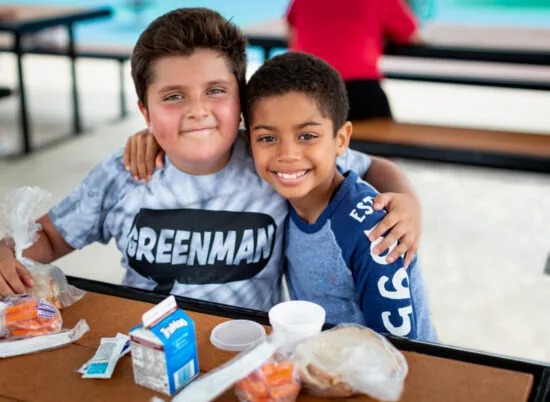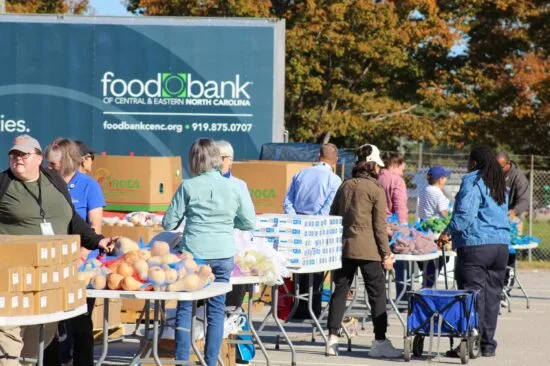Weekend Power Packs: Helping Kids Thrive

We know that kids thrive when they have access to no-cost breakfast and lunch at school.
Research consistently shows that healthy school meals help kids pay attention and stay engaged — which leads to better grades, more consistent attendance, and higher graduation rates. It’s why we’re big fans of the School Meals for All movement (and hope you’ll join us and get involved!). And at a time when nearly 60% of kids across North Carolina children qualify for free and reduced-cost meals at school, universal access can’t come soon enough.
But what happens on the weekends?
Map: Students Enrolled in Free & Reduced-cost Meals
Interactive map courtesy of our friends at NCchild.org

Weekend Power Packs
Weekend Power Packs provide kids and teens with a backpack full of shelf-stable food to take home for the weekend or over school breaks.
Each week, Food Bank partners assemble these backpacks for discreet distribution to students by social workers, counselors, teachers and school support staff. Power Packs contain a variety of protein, fruits and vegetables, snacks, milk, cereal, and other items that can be easily prepared at home — helping to ensure families have options when school meals are unavailable.
Weekend Power Packs began in 2005 with 30 students at a single school and has grown to support more than 14,000 children and teens across 200 campuses!
Support Local Kids!Major Impact with Deep Roots in Schools
Programs like Weekend Power Packs got their start in Little Rock, Arkansas back in 1995. School staff observed that many students reported feeling sick or tired because they were hungry and did not have enough to eat at home. They connected with their local food bank to launch a program that provided non-perishable food for kids to take home for over the weekend.
Since then, local schools have partnered with food bank networks like ours to make sure students have access to nutritious food all week long. Today there are more than 10,000 active backpack programs across the country, hosted by schools, Boys & Girls Clubs, and community centers affiliated with the Feeding America Network.
– Jasmine Lewis 8th Grade Educator“Hunger really takes a toll on students’ academic performance. It’s tough for them to concentrate, which affects their ability to participate in class and do well on tests. They often fall behind because they can’t retain what they learn as effectively… [Our] students often express anxiety about school breaks because they’re worried about where their next meal will come from. This was particularly true with my students from migrant communities. They would request extra food to take home on breaks.”

Studies have consistently demonstrated the success of backpack programs. Analysis of programs in North Carolina, New Hampshire, and New Jersey showed a measurable increase in students’ math and reading scores, alongside positive impacts on self-esteem and behavior at school. Fewer parents report running out of money for food each month. And schools regularly observe improved academic performance and attendance — setting students on a path for success well into the future.
– Dare Kumolu-Johnsons 11th Grade Educator“I have seen instances in which students who are hungry don’t complete homework and group projects. They often sleep in class and/or tend not to actively participate in learning activities. When they have access to meals and snacks, the same students have been more attentive in class, contributing to class discussions, and consequently performing better.”

Take Action Today
News & Updates
See All News
Supporting Neighbors During Pop-Up Market Transitions

Honoring Rev. Jesse Jackson's Legacy

Celebrating Hunger Relief Heroes During Black History Month

Black History and the Fight to End Hunger
Stay connected to the Food Bank
Sign-up to receive emails with updates, resources, and ways to get involved.